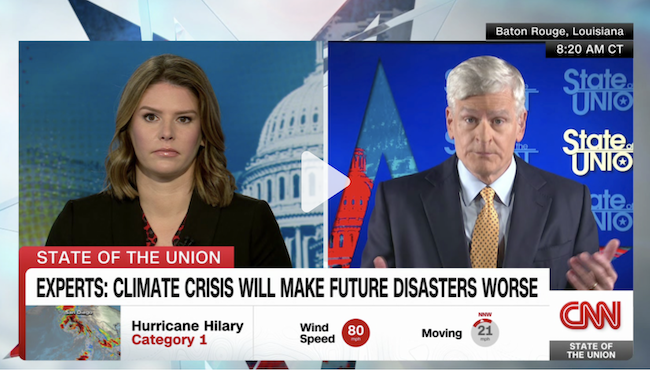
Sen. Cassidy appeared on CNN to discuss the introduction of his Foreign Pollution Fee Act of 2023.
Republican Senators introduce foreign pollution fee bill
By Flannery Winchester
Last week, Senate Republicans Bill Cassidy of Louisiana and Lindsey Graham of South Carolina introduced the Foreign Pollution Fee Act of 2023. That name is pretty snappy compared to the wonky phrase “carbon border adjustment mechanism,” or CBAM — but that’s essentially what the legislation is.
An analysis from Resources for the Future explains that the goal of the bill “is to reduce the United States’ ‘consumption’ of greenhouse gases embodied in imported goods and provide a new lens through which to view the alignment of international trade with climate objectives.”
Politico points out the notable Republican leadership, saying the legislation “represents the first GOP-led proposal to inject climate change policy into U.S. trade rules.”
“It is long past time that the polluters of the world, like China and others, pay a price for their environmental policies. This bill calls out the foreign polluters and rewards American businesses who are doing the right thing,” Sen. Graham said in a statement upon the bill’s release. “We are leveling the playing field, and American manufacturers and business will be the biggest beneficiaries.”
Encouraging results after years of citizen lobbying
One factor leading to the introduction of this legislation is Europe’s CBAM policy, which is changing the international playing field. As Sen. Sheldon Whitehouse (D-RI) pointed out at CCL’s conference in June 2022, “If we [America] step up with a carbon border adjustment of our own, it’s a really big win.”
Another factor is CCL volunteers’ lobbying about this type of policy for years. It’s part of what CCL has been lobbying Congress about since… well, basically since we started lobbying Congress. Our preferred climate policy has always included three key elements: 1) a rising fee on carbon emissions, with 2) a cash dividend that goes to Americans each month, and 3) a border carbon adjustment, now more commonly known as a CBAM.
We drilled down on that third element in June 2022, when we highlighted CBAMs as a primary ask specifically for Republican Senators. Sen. Whitehouse talked about his own CBAM proposal, the Clean Competition Act, at that same conference.
So, to see Republican Senators not only open to the idea of this policy approach, but actually taking the lead and introducing their own bill, is a very encouraging step forward. Sens. Cassidy and Graham are listening to their constituents, taking the reins, and putting conservative political concerns and messaging front and center in the climate policy discussion.
Sen. Cassidy’s press release about the bill introduction says, “The Foreign Pollution Fee is an American plan to address the nexus between energy, economic development, supply chains, national security, and the environment at the expense of China and Russia.” Even without explicitly stating climate action as a goal, this bill would still move America — and the world — in that direction.
And, encouragingly, in an E&E article about the Foreign Pollution Fee, Sen. Whitehouse said, “There’s a prospect for real bipartisanship here.”
CCL won’t be lobbying on this particular bill right now — the bill text doesn’t specify at what price the pollution fee would be set, nor how the revenue would be used, and we would want to know those details and analyze the expected impacts before lobbying. Still, we’re very encouraged to see this bill come on the scene and excited by the possibility of more bipartisan common ground in this area. We appreciate Sens. Cassidy and Graham for their leadership in advancing the climate policy conversation in this way.
Republican voters want to see this type of action
New polling from the Yale Program on Climate Change Communication shows that Americans, including Republicans, are concerned about climate change and want to see solutions. One in four Republicans are alarmed or concerned about climate change, and of those, they tend to be younger, women, and suburban voters.
By introducing this legislation, Sen. Cassidy and Sen. Graham are showing that they’re taking those concerns seriously. They’re offering an alternative to the “business as usual” attitude toward climate action and fossil fuel usage that is often seen among other congressional Republicans, including the new Speaker of the House, Rep. Mike Johnson.
Johnson has “consistently voted against dozens of climate bills and amendments, opposing legislation that would require companies to disclose their risks from climate change and bills that would reduce leaks of methane, a potent greenhouse gas, from oil and gas wells,” the New York Times reports.
That approach to climate issues is clearly out of step with Americans overall, including what some key Republican voters are looking for. Sens. Cassidy and Graham are showing that, instead, conservative leadership can lead to legislation that benefits America’s economy while spurring further reductions in climate pollution.
Brush up on CBAMs with our recent Understanding Carbon Border Adjustment Mechanisms training with CCL Research Coordinators Dana Nuccitelli and Rick Knight.




